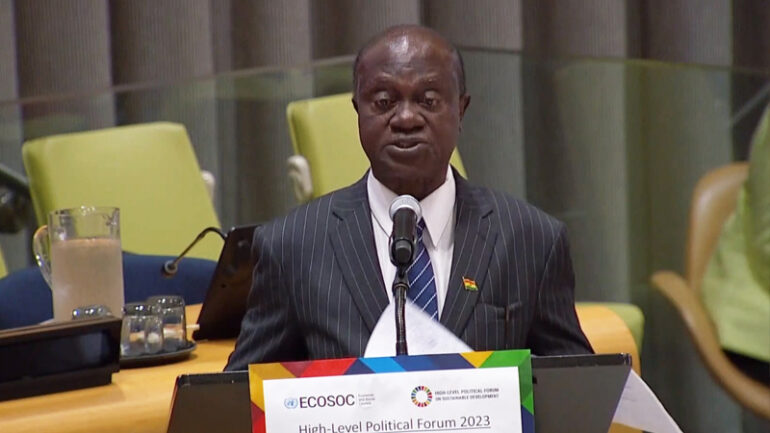United Nations High-level Political Forum on Sustainable Development (HLPF)

- Posted by admin
- Posted in Statement & Remarks
Prof. George Gyan-Baffour
National Development Planning Commission
New York, New York
July 18, 2023
AT THE GENERAL DEBATE AT THE 2023 HIGH-LEVEL POLITICAL FORUM ON SUSTAINABLE DEVELOPMENT
Excellencies
Distinguished Delegates,
Ladies and gentlemen,
Ghana aligns itself with the statement delivered by the distinguished representatives of Cuba and Tanzania speaking on behalf of the G-77 and China and the African Group respectively. I wish to make the following additional remarks in my national capacity. Permit me to first use this opportunity to bring you greetings from His Excellency, Nana Addo Dankwa Akufo-Addo, the President of Ghana and the good people of Ghana.
Distinguished Delegates, for us in Ghana, the pandemic had considerable impacts on the economy with employment declining by 6.3 percent, debt to GDP ratio increasing to 78.4 percent, fiscal balance reaching negative 13.5 percent, a decline in GDP growth rate, and decline in demand for goods and services and private consumption. In a bid to return the economy to its pre-pandemic levels and even better, we launched the GH¢100 billion Ghana COVID-19 Alleviation and Revitalisation of Enterprises Support (Ghana CARES) Programme to provide financial support to businesses that had been affected by the pandemic.
Distinguished Delegates, another aspect of our recovery process involved support from the international community, including the IMF. We achieved a staff level agreement with the IMF in December, 2022 and after securing the necessary financing assurances required the IMF Executive Board approved on May 17th, an SDR 2.242 billion (about US$3 billion) 36-month Extended Credit Facility (ECF) arrangement for Ghana. This decision enabled an immediate disbursement equivalent to SDR 451.4 million (about US$600 million). Our IMF programme has three key objectives, first is to restore macroeconomic stability, the second is to ensure that debt is put on a sustainable path; and finally, to lay the foundations for stronger and more inclusive growth.
We have also put in place a post-COVID-19 Programme for Economic Growth (PC-PEG). The programme is anchored on a seven-point agenda: Aggressively mobilize domestic revenue; Streamline and rationalize expenditures; Boost local productive capacity; Promote and diversify exports; Protect the poor and vulnerable; Expand digital and climate-responsive physical infrastructure; and Implement structural and public sector reforms. Notwithstanding the fiscal consolidation under the IMF programme, we have doubled the level of benefits of the existing cash transfer program, the Livelihood Empowerment Against Poverty (LEAP) programme. The coverage of the program is being expanded, and its targeting improved, to cover the extreme poor by 2024.
We have increased the budget allocation for the Ghana School Feeding Program to offset the impact of inflation and ensure that children get more nutritious meals at school. We have intensified the implementation of water projects. We are targeting 90% of the population with access to basic drinking water in 2023 compared with 87.7% in 2021. We have increased the active membership of the National Health Insurance Scheme to 17.2 million or 55% of the population being the highest membership of the scheme at any particular period.
Distinguished Delegates, Ghana’s progress regarding the implementation of the SDGs has been mixed as a result of the COVID impacts. We can however report that Gender parity and high completion rates were sustained at the KG, primary, and junior high School levels while the population participating in formal and informal education, and training went up. There has also been improved outcomes in tackling maternal mortality; women’s participation in Governance and access to electricity.
Distinguished Delegates, Finally, as Chair of the Climate Vulnerable Forum (CVF) and the V20 Group, Ghana, has been at the helm of the calls for a fit-for-climate global financial architecture through the Forum’s Accra Marrakech Agenda which advocates for debt sustainability and climate prosperity for the climate vulnerable through reforms to the Common Framework, credit enhancements and debt treatment that supports the development of climate resilience and the transition to climate-smart development; and advocates for a new global deal on carbon financing with a focus on equity and climate justice in order to direct financing towards adaptation amongst the climate vulnerable.
In conclusion, Ghana reaffirms its commitments to achieving the SDGs and Africa Agenda 2063. We are action oriented and call for collaborations and partnerships with other member states and organisations in ending poverty in all its forms everywhere.
Thank you for your kind attention.
